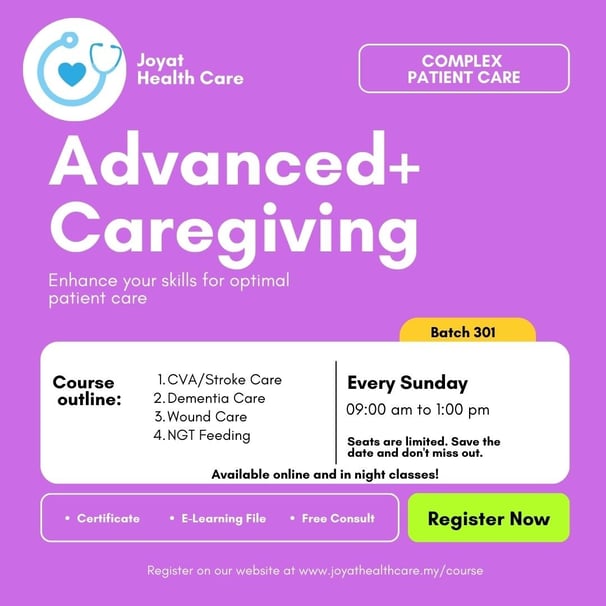JHC Advanced+ 301


Advanced Caregiving+: Specialised Training for Complex Patient Care
Purpose: This advanced caregiving course is to equip healthcare professionals and self-home support with specialised knowledge and skills necessary to provide high-quality, effective care in complex patient scenarios. By completing this course, participants will be better prepared to handle the complexities of advanced caregiving, leading to improved patient care.
Course Details
Schedule: Every Sunday of the month
Duration: 9:00 AM to 1:00 PM (4 hours including breaks)
Location: 88A, Jalan Nb2 1/4, Taman Nusa Bestari 2, 81300 Skudai, Johor
Registration Fee: RM 350 (Includes e-learning materials)
Capacity: 15 participants per session
Certification: Certificate of Achievement upon completion
Participants have the flexibility to complete the course within the month of registration, selecting the best date to suits their schedule.
Course Summary: Advanced Caregiving Skills
This advanced caregiving course focuses on essential areas of specialised patient care, providing participants with in-depth knowledge and practical skills to handle complex caregiving scenarios effectively. The course is designed for healthcare professionals and self-home support seeking to enhance their expertise in specific areas of patient management.
1. CVA/Stroke Care
Participants will learn the comprehensive approaches to managing and supporting patients who have experienced a cerebrovascular accident (stroke). This module covers:
Understanding Stroke: Types, symptoms, and risk factors.
Immediate Response: Emergency care and treatment options.
Rehabilitation: Techniques for physical, speech, and occupational therapy.
Long-Term Management: Strategies for ongoing care and lifestyle adjustments.
Learning Outcome: Participants will be able to provide effective care for stroke patients, including acute management, rehabilitation strategies, and long-term support.
2. Dementia Care
This module focuses on the specific needs of patients with dementia, offering strategies to enhance quality of life and manage challenging behaviors. Topics include:
Types of Dementia: Alzheimer’s disease, vascular dementia, and others.
Behavioral Management: Techniques to address common behavioral issues.
Communication Strategies: Effective ways to interact with dementia patients.
Care Planning: Creating personalized care plans and involving family members.
Learning Outcome: Participants will gain skills to support and care for individuals with dementia, improving their overall well-being and managing care-related challenges.
3. Wound Care
Participants will learn advanced techniques for assessing and managing various types of wounds. This module covers:
Wound Assessment: Identifying types, stages, and severity of wounds.
Treatment Options: Advanced dressing techniques and infection control.
Pressure Ulcer Prevention: Strategies to prevent and manage pressure sores.
Healing Processes: Understanding and promoting effective wound healing.
Learning Outcome: Participants will develop the ability to manage complex wounds effectively, including advanced treatment techniques and prevention strategies.
4. NGT Feeding (Nasogastric Tube Feeding)
This module provides knowledge and skills for administering nutrition through a nasogastric tube. Topics include:
Tube Insertion: Proper techniques for NGT placement.
Feeding Procedures: Safe and effective methods for tube feeding.
Monitoring and Maintenance: Ensuring proper function and addressing complications.
Patient Care: Managing patient comfort and addressing issues related to NGT feeding.
Learning Outcome: Participants will be proficient in performing and managing nasogastric tube feeding, ensuring safe and effective nutritional support for patients.
Overall Course Outcomes:
By the end of this course, participants will be equipped with advanced skills to handle specialised caregiving tasks, providing high-quality care for patients with stroke, dementia, complex wounds, and those requiring nasogastric tube feeding. This comprehensive training enhances their ability to manage challenging patient scenarios and improve overall patient outcomes.
Address: 88A, Jalan Nb2 1/4,
Taman Nusa Bestari 2,
81300 Skudai, Johor
Telephone: +6016-7613101
Follow us
Joyat Health Care Sdn. Bhd.
(148223-M)
Copyright © 2022
Joyat Health Care Sdn. Bhd. (1482236-M)
All rights reserved*.
For more information, please e-mail us at


